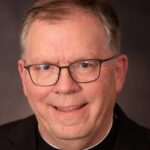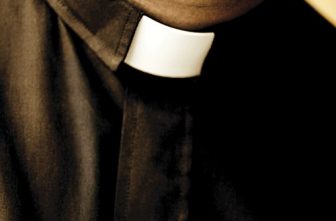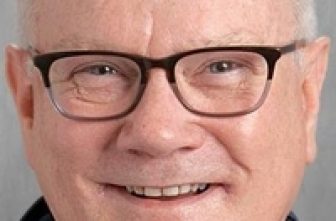We are hearing much in these days about people’s experience of the 10th National Eucharistic Congress that took place in Indianapolis. While thousands attended, there were many who were not in Indianapolis, but experienced the National Eucharistic Revival closer to home. Opportunities included the Source and Summit Eucharistic procession on Memorial Day in St. Paul and many other events hosted by parishes in our archdiocese that were along the Marian Route of the National Eucharistic Pilgrimage.
One moment that will long be engraved in my memory is the Eucharistic procession at St. John the Baptist in Vermillion. It is one of the parishes I serve, and our Catholic elementary school students lined the street opposite the church to silently and attentively watch as the procession went by. Any parent with elementary-aged children will readily know that this is no small feat. Their reverence was deeply motivated by something that they couldn’t necessarily explain but clearly knew and recognized as uniquely present before them. It reminded me of Jesus’ words about the kingdom of God belonging to children. Students followed the Blessed Sacrament into the church, where our fourth graders prayerfully led the rosary before Benediction for the many people who gathered for this local event.

In addition to the Eucharistic Congress and processions, we’ve heard in recent days about Blessed Carlo Acutis and the intent of Pope Francis to canonize him as a saint. Blessed Carlo was born in 1991 and died in 2006 at the age of 15 from leukemia. His tomb is in Assisi, Italy. While I was on a recent pilgrimage with a group of Catholic school principals from our archdiocese, we had the chance to visit Blessed Carlo’s tomb and learn his story, which includes a deeply Eucharistic life and Marian devotion. As the first millennial expected to be canonized as a saint, Blessed Carlo, like many of his generation, was engaged in a world of computers to the extent that some have suggested him as the patron saint of the 21st century, young people and technology. Blessed Carlo was known to use his computers to learn about Eucharistic miracles that he then catalogued. Blessed Carlo’s goal in life was, “To always be close to Jesus, that’s my life plan.” It’s a good life plan for all of us.
Appropriately enough, there has been a great focus on the Eucharist these days, whether in the form of the Eucharistic Revival or the life of Blessed Carlo. Each of these is an opportunity for all of us to renew our belief in Jesus being present –– body, blood, soul and divinity –– in the Eucharist we receive at each Mass. As we focus on the Eucharist, on some occasions we also hear about Eucharistic miracles as extraordinary experiences. But we sometimes forget that the Eucharist is nourishment for our journey of life that results in miracles that routinely happen around us every day.
St. Augustine talks about our becoming what we receive in the Eucharist. This is in the sense of our being instruments of God’s love and peace for our world. As we renew our belief in Jesus’ presence in the Eucharist, we pray for the grace to become what we receive in ways that point to ordinary Eucharistic miracles that are changing the world.
Consider, for example, those who feed the hungry or care for the sick. Nourished by the Eucharist, there are people around us who are putting faith into action in miraculous ways to show the compassionate face of Christ to those who might be lost and forgotten. Or consider those who welcome the stranger or work for peace and justice. With August nearly here and the beginning of a new school year soon to come, we can consider those who educate students, whether in a Catholic school or a parish faith formation program. Each of these examples, and many more that we might add, remind us that the Communion we share sends us out each day in miraculous ways to share the love of God with others. The Eucharist is a miracle that transforms our lives, and through each of us, transforms our world. The Eucharist also calls us to greater conversion in our own lives as we seek to grow closer to Jesus and continue the mission entrusted to us –– of bringing something of the kingdom of God to our time and place.
May our “Amen!” to the words, “the body of Christ” and “the blood of Christ” in these summer days acknowledge the gift of the Eucharist and the many miracles that arise out of this gift of heaven, which continue to feed us as manna in the desert for our journey of life.




